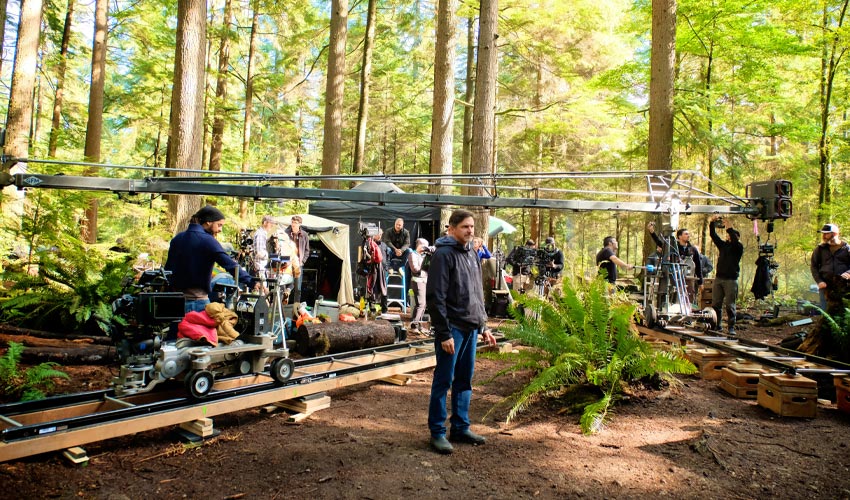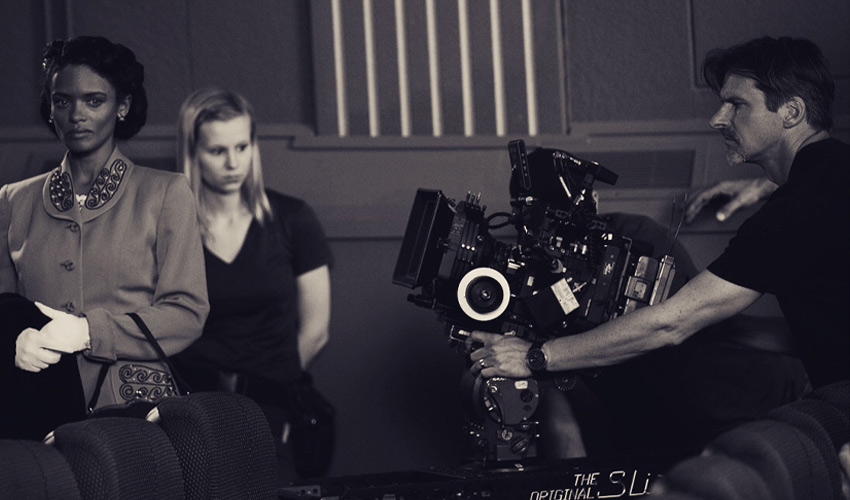A behind-the-scenes glimpse into The Umbrella Academy
Alumnus and award-winning cinematographer Craig Wrobleski director of photography for Netflix’s hottest show

Broadcasting Diploma alumnus Craig Wrobleski is pictured surrounded by gear on the set of the FX show Legion.
Craig Wrobleski is an award-winning cinematographer currently working on Netflix’s fan-favourite series, The Umbrella Academy. He also picked up his very first video camera at Mount Royal.
After graduating from Mount Royal’s Broadcasting Diploma program in 1988 and spending some time at a local television station, Wrobleski broke into the film biz as a freelancer and has since worked on several groundbreaking and iconic shows. Along with The Umbrella Academy, Wrobleski has been the director of photography for Fargo, the Twilight Zone, the X-Files, Tales From the Loop, Legion, Heartland, and many more. He has been nominated for an American Society of Cinematographers award, has won two Canadian Society of Cinematographers awards, and has numerous Alberta Film Industry Awards recognitions on his resume.
The undeniable success of The Umbrella Academy has been a career high for Wrobleski. Shot in Toronto and Hamilton, the show about a dysfunctional family of superheroes facing off against a looming threat to humanity has tapped into a much-needed sense of hope in the ability to make change at a time when much seems out of control. The characters are superheroes, yes, but they also have realistic personalities that are interesting, multi-faceted and flawed. It’s about morality in the face of strife, how we are stronger together, and finding opportunity where others see none. Supported by an excellent cast, the storyline is expertly unwound through Wrobleski’s cinematic choices and underscored by an incredible (and often surprising) soundtrack.
What attracted Wrobleski to The Umbrella Academy and the Hargreeves, who reunite to solve the mystery of their father’s death and save the world, was the “incredible humanity in the stories,” he says.
“It has really fantastic elements that are just out of this world, but underneath it all, it has a beating heart. And that's why I think it resonates with people. No matter how crazy the show gets, it's always grounded in some version of reality that's relatable to people.”
The Hargreeves have all the same problems that every family has, Wrobleski says. “They just have to deal with their problems in an incredibly bizarre way sometimes. Essentially, The Umbrella Academy is a family drama at its core.”
The first look through the lens

Craig Wrobleski behind the camera as cinematographer in 2016 for Heritage Minutes ― Viola Desmond. Desmond challenged segregation in Nova Scotia in the 1940s. Heritage Minutes is a series of short films highlighting important events in Canadian history.
Wrobleski remembers his time at Mount Royal well, saying his instructors were open-minded and influential, making it a great environment for students to figure things out on their own. The power that was afforded to Wrobleski and his peers to discover their own strengths is reflective of what the characters in The Umbrella Academy also experience. They grow organically, and mistakes are made, but as they learn to believe in themselves, anything becomes possible.
With a love of music that is still deeply entrenched in his life today, Wrobleski attended Mount Royal with initial plans to work in radio. An introduction to television course changed all that in one transformational moment, however. The first time Wrobleski touched a camera he felt a peculiar familiarity.
“It was the weirdest thing,” he says. “I just felt like I knew what to do with it. I've never experienced that any other way. It was almost like some reincarnation thing, where I'd done this before.
“I didn't see it coming, which was kind of the most interesting part of it.”
Cameras quickly became a “complete obsession,” and Wrobleski spent most of his second year at Mount Royal trying to shoot anything he possibly could. He landed a job at CFCN TV while still a student, editing shows to remove American commercials and add in Canadian ones (a job they called “deletions”). When he graduated he was able to move into the studio part time operating a camera.
But being inside all day was not where Wrobleski wanted to be. He had seen what CFCN’s news people were doing out in the field, and had also managed to find a stash of American Cinematographer magazines, a publication focusing on dramatic film production.
“It opened my eyes to this idea that maybe someday I could make movies with a camera,” Wrobleski says. “I woke up one morning and said, ‘I’ve got to pursue that.’” He quit his job at CFCN with the support of his superiors and began freelancing. There was more opportunity then, he says, with a lot more television filmed locally. It wasn’t always easy, but his strong work ethic and commitment to a beautiful, professional product has led to him being a sought-after cinematographer who is able to produce the right look and feel for the most complicated of projects.
The secret to success
“I think part of the reason for my success is that I've always focused on the work and I've always focused on getting better,” Wrobleski says. “The reality is that cinematography is a job you never get good at, you just get better. If I ever think I have this figured out, I might as well quit because I don't know where you go from there.”
View this post on Instagram
Every day he learns something, every day he strives to find ways to tell stories that are more impactful, more meaningful, more clear, he says. It’s a field that can be very competitive and challenging, with a lot of financial and creative pressure placed upon both the speed and the quality of the final production. The fundamentals of being a good person have been foundational.
“It's really just trying to do the best work you can and be respectful of the people you're working with. The film set is a really intense environment … that's just a natural state of being. So, if you can handle that situation in a way that helps other people deal with everything that they're dealing with, then you can be part of the solution.”
The Umbrella Academy, heading into its third season, is estimated to be watched by 45 million people and competes for the attention of the public against hundreds and hundreds of other scripted shows. It’s a “Wild West” out there, Wrobleski says, one that requires him to be at his best at all times. To do so, he concentrates on immersing that one single person in the moment.
“I can't even think about the fact that 45 million people are going to watch,” he says. “The key is to be shooting for that one person and try to give them the best version of the story you can so that they can have the experience that the writers and the directors intended.”
With every shot, Wrobleski and his colleagues strive to “create that moment that is just purely transcendent and magical.
“I've had that experience a number of times. I've been really fortunate to work on projects that are that transformative.” When he forgets he’s at work, when everything else melts away and he is completely present, that’s when he knows it’s working. It’s only when the director yells “Cut!” that reality comes back.
The talent of the “incredible performers” Wrobleski has had a chance to work with, such as the likes of Elliot Page, Aiden Gallagher, Ewan McGregor, Billy Bob Thornton and Kirsten Dunst, helps tie everything together.
“All of them are just so phenomenal that they just take you to a different place. And it's a real privilege to be in the front row seat for that,” Wrobleski says.
For the filmmakers of tomorrow
Mount Royal’s students interested in becoming filmmakers may not have as many of the local opportunities available to them that Wrobleski did, but he says that technology is allowing for the creation of different ones. With just a mobile phone, students can film, edit and upload videos, something unheard of just a short time ago.
“When I went to school, you had to get a big, heavy camera and then go into a room full of equipment to edit,” Wrobleski says, and then the next major challenge was finding someone to show what you did.
“It's a great opportunity for students to go to school to learn filmmaking techniques, and then they have the technology at their disposal to find their way to use those techniques in a way that is unique to them.”
In addition to his skills, Wrobleski’s personality, willingness to work with others and commitment to the craft have been key to his accomplishments. He advises others to learn who they are as an artist and a filmmaker and convey that as much as possible.
“What gets you hired out in the world as a freelancer is who you are as an individual,” Wrobleski says. “It's really how you use those skills to tell your own stories and to have your own voice.”
Explore the School of Communications Study, including the Bachelor of Communication — Broadcast Media Studies. Learn more about Mount Royal University and how to apply.
Jan. 4, 2021 — Michelle Bodnar
Media request contact information.
Have a story idea? Please fill out this form.
